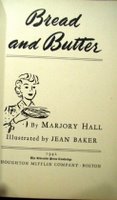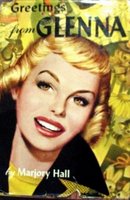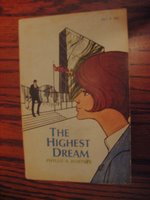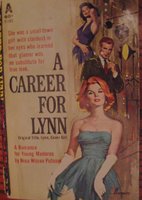You Can't Tell About Love
 You Can't Tell About Love, by Helen Diehl Olds, 1950
You Can't Tell About Love, by Helen Diehl Olds, 1950Lively and typical CRFYM about the beauty biz. Fun training scenes in the school, and wonderful goofy, dated details about how women used to get their hair done.
Main character: Susan Day, not to be confused with Susan Dey from "Partridge Family" fame.
Career: After attending South Shore Beauty School, Susan goes to work at the Beauty Box, a small salon. She moves on to her dream job working on a TV show about teens and beauty -- but wait! This is 1950! As the book's interior flap says, "how she learned that marriage is just as important as a career and that a smart girl can have both is a modern romance told against the million dollar beauty business.
Gael's grade: B+Trauma #1: Susan has a nemesis, Avis Blake, who has a facial scar and is just as scarred inside. She'll do anything, including ruin Susan's hair, to try and put our heroine down and steal her man, Larry Knight. In the end, however, our brilliant Susan finds a cover-up for Avis' scar (Sculpto Skin!) and Avis becomes her biggest fan.
Trauma #2: After graduation, Susan and widow-at-21 Miriam begin working at Mrs. Wells' small shop, the Beauty Box. But no! A fancy shop opens around the corner that can outspend them. And no again! Mrs. Wells' husband is ill and must move to Daytona Beach, Florida, so she moves with him and the girls take over the shop. But the girls work hard and make their own business, especially after they hire a bunch of teens to essentially run a child-care center at the shop. The teens care for kids whose moms are being pampered, and in exchange, Susan and Miriam teach the girls about beauty and personal care.Trauma #3: Mrs. Wells warns the girls about a customer in a shiny station wagon. One day she shows up when Mrs. Wells is gone. Turns out she buys a lot of services and then takes off without paying. She rips Susan off for $50, but gets caught in the end.
Prince Charming: Larry Knight, who works fixing appliances at his radio shop.
What's standing in their way?: Avis, of course. But mostly the idea Larry has that he is too broke to wed.How does he come to his senses?: He makes more money, enough that he feels comfortable proposing, even though they may have to live in "a trailer or small apartment." He then asks "And what about your career? Will it combine with being Mrs. Larry Knight?"
DUH! This is a Career ROMANCE for Young Moderns! The Mrs. degree outranks any other professional classification in these books!
Signs o' the times:
There's a whole lesson on pin curls. They sound horrible.
Mean ol' Avis calls a deaf student "Dummy," as in "deaf and dumb."
They use a "waving machine" for giving perms.
Larry drives an "Army Jeep painted aluminum." (Was aluminum considered a color in the 1950s?)
A poor woman stops by the beauty shop and randomly sings a song she wrote, "Believe and Trust," so she'll be given a quarter.
Larry freaks out when he sees the milk bill for Susan's brother, sister-in-law, and toddler daughter. "I don't see how a guy ever can afford to get married," he whistles. The milk bill?
Susan thinks "Television, a combination of movies and radio, would offer many opportunities for women. ... Wardrobe mistress, scenic designer, and programs like tonight's. Again she thrilled that she had made up her mind to enter this new beauty field."
Quote that says it all:
"Another thing." Miriam slid the broom about. "The home-permanent craze has hit this town."
"One of Coralee's friends gave herself one while she made an apple pie. Ugh!" Susan made a face at the idea.
"Home perms are no economy. They don't last long in most cases," Miriam pointed out. "You'd need one every few weeks."
"Beauty work should be done in a shop," Alice stated, and the other two agreed."
AND
"Did you girls know that in an emergency you can use cologne instead of water or wave set?It dries fast and leaves the hair fluffy."
Yeah, but I can't think of an emergency where I have COLOGNE at hand and not WATER.
Labels: hairdresser








